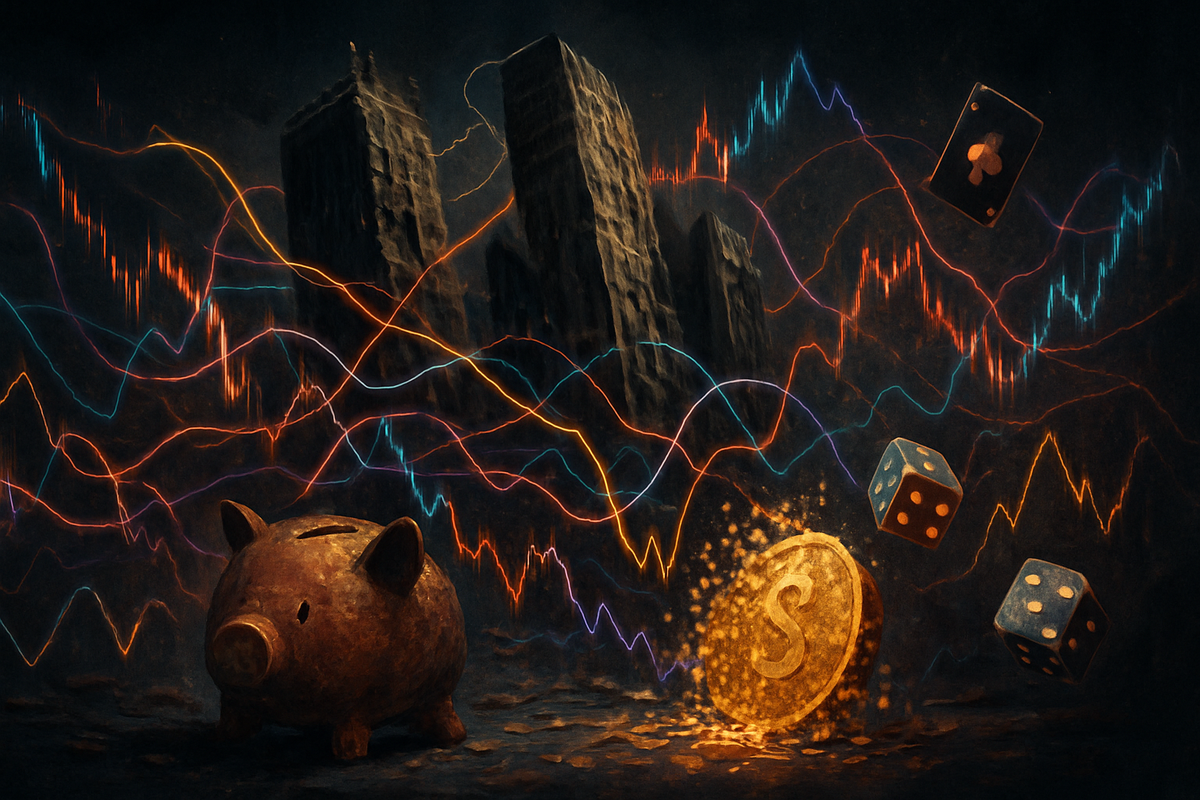
In an era marked by economic uncertainty and a pervasive sense of disillusionment, a new phenomenon is gaining traction in financial markets: financial nihilism. This mindset, characterized by a profound loss of faith in the intrinsic value of money, traditional financial systems, and conventional investment practices, suggests that asset prices are increasingly driven by momentum, narrative, and collective sentiment rather than underlying fundamentals. Its rise signals a potential paradigm shift, challenging the very foundations of long-term financial planning and risk assessment.
The immediate implication of financial nihilism is a discernible pivot towards high-risk, high-reward ventures, often at the expense of established investment wisdom. This shift not only introduces heightened volatility but also raises critical questions about capital allocation, market stability, and the future relevance of traditional economic indicators. As this philosophy permeates investor behavior, it threatens to reshape market dynamics, creating a landscape where narratives can trump balance sheets and speculative fervor can overshadow tangible value.
The Unraveling of Faith: What Happened and Why It Matters
The concept of financial nihilism, popularized by Demetri Kofinas, host of the "Hidden Forces" podcast, emerged around 2019-2021 as a response to deep-seated economic and societal frustrations, particularly among younger generations. At its core, financial nihilism reflects a belief that the traditional path to financial security – a stable job, homeownership, and retirement savings – is increasingly unattainable. Stagnant wages, soaring living costs, crippling student loan debt, and an inflated housing market have rendered the "American Dream" an illusion for many, fostering a sense of systemic unfairness.
The catalytic event for this disillusionment can largely be traced back to the 2008 Financial Crisis. The perceived lack of accountability for those responsible, coupled with the Federal Reserve's expansive monetary policies and prolonged ultra-low interest rates, cemented a belief that the system is "rigged." This environment has bred a postmodern investment framework where "price becomes self-referential," completely detached from underlying reality. Much like classical nihilism denies universal truths, financial nihilism perceives money and economics as devoid of intrinsic meaning, serving primarily as tools of control. This epistemic problem, where individuals see nothing worth believing in financially, can lead to a sense that true wealth building is impossible, making financial ruin less daunting.
This profound skepticism manifests in current financial markets through several key behaviors: a strong preference for speculative investing over fundamentally sound assets. This includes the explosive growth of cryptocurrencies like Bitcoin (CRYPTO: BTC), Dogecoin (CRYPTO: DOGE), and Pepe (CRYPTO: PEPE), which are often seen as a direct rejection of traditional finance, driven purely by speculative demand and hype. Similarly, the rise of meme stocks, such as GameStop (NYSE: GME), AMC Entertainment Holdings (NYSE: AMC), and even Hertz Global Holdings (NASDAQ: HTZ) during its bankruptcy, showcases coordinated buying driven by social media sentiment and a desire for quick gains, often disregarding corporate fundamentals. The gamification of finance, facilitated by user-friendly trading apps, further reinforces the idea of markets as a "big casino," where investing is akin to gambling. Decisions are increasingly based on narrative investing – compelling stories and social media trends – rather than diligent financial analysis. This collectively signifies a rejection of "getting rich slow," pushing investors towards "moonshot bets" in hopes of rapidly transforming their financial situation.
The Market's Reckoning: Who Wins and Who Loses
The pervasive spread of financial nihilism carries profound implications for market stability and the allocation of capital. When valuations are driven by narrative rather than fundamentals, it leads to capital misallocation, diverting funds from productive enterprises to speculative ventures, thereby hindering genuine innovation and long-term economic growth. Companies with strong fundamentals but lacking a compelling "narrative" may find it increasingly difficult to attract investment compared to those benefiting from speculative fervor.
In this environment, agile speculators who can effectively ride momentum and narrative waves in highly volatile assets for short-term gains are positioned to win. This includes professional traders, hedge funds, and sophisticated retail investors adept at technical analysis and quick execution. "Storytellers" and influencers who can create and disseminate compelling narratives that drive speculative interest, particularly in the crypto and meme stock spaces, also gain significant power. Furthermore, platforms facilitating speculation, such as trading apps offering gamified experiences and easy access to high-risk assets, stand to benefit from increased engagement and trading volumes.
Conversely, the losers in a nihilistic market could be numerous. A significant portion of retail investors without expertise in market dynamics or risk management are highly susceptible to substantial losses from speculative trading. Long-term, value-oriented investors and traditional investment strategies, which rely on fundamentals, patience, and stable market growth, may find themselves underperforming or dismissed as irrelevant. Companies with strong fundamentals but a weak narrative could struggle to attract necessary capital, potentially stifling their growth and innovation. Ultimately, the broader economy suffers from increased market instability, weakened investor confidence, and the potential erosion of trust in financial institutions, jeopardizing overall economic stability and long-term growth.
Broader Implications: A Challenge to the System
Financial nihilism is not merely a trading strategy; it represents a fundamental challenge to the established order of financial markets and broader economic principles. This phenomenon fits into a larger trend of eroding trust in institutions and expertise, mirroring societal shifts seen in politics and media. The potential ripple effects are far-reaching, impacting not only individual investors and specific companies but also the regulatory landscape and the very fabric of capitalism.
The prevalence of narrative-driven markets and speculative bubbles could lead to increased systemic risk, making the financial system more vulnerable to sudden crashes and prolonged instability. This environment could also exacerbate wealth inequality, as those with the resources and expertise to navigate highly volatile, speculative markets potentially accrue significant gains, while less informed participants suffer losses. From a regulatory standpoint, existing frameworks, designed for markets based on fundamental value and orderly price discovery, appear increasingly inadequate. Regulators may need to adapt by scrutinizing social media influence on market manipulation, rethinking consumer protection in highly speculative asset classes, and strengthening institutional frameworks to mitigate instability. Historically, periods of extreme speculation, like the Dutch Tulip Mania or the Dot-com bubble, offer cautionary tales of what happens when asset prices decouple from intrinsic value, though the current environment is unique due to technological advancements and widespread information dissemination. The current trend suggests a need for a re-evaluation of how capital markets function and whether they are serving their intended purpose of efficient capital allocation.
What Comes Next: Navigating the New Frontier
The trajectory of financial nihilism and its impact on markets will depend on several factors, including the global economic outlook, regulatory responses, and the evolving sentiment of younger generations. In the short term, we can expect continued volatility in speculative assets, with "meme" phenomena and cryptocurrency surges and crashes remaining prominent. Investors should prepare for rapid shifts in sentiment and price, driven by social media trends and influential figures.
Strategically, traditional financial institutions and advisors may need to adapt their approaches, acknowledging the allure of speculative assets while emphasizing robust risk management and education. There's a potential for new financial products or platforms that blend traditional investment principles with elements of speculative appeal, offering a more balanced approach. Market opportunities may emerge for companies that can genuinely demonstrate tangible value and sustainable growth, as a counter-narrative to pure speculation. Conversely, challenges will persist for businesses struggling to articulate their fundamental worth in a market obsessed with hype. Potential scenarios range from a gradual re-anchoring of markets to fundamentals (perhaps driven by a severe market correction or robust regulatory intervention) to a more extreme future where speculative behavior becomes the norm, leading to increased systemic instability. Investors should watch for shifts in regulatory posture, particularly regarding cryptocurrencies and social media-driven trading, as well as broader economic indicators that might either reinforce or challenge the nihilistic outlook.
Conclusion: Reclaiming Value in a Disenchanted Market
Financial nihilism represents a profound crisis of faith in the conventional financial system, born from a generation's disillusionment with economic opportunity and perceived systemic unfairness. It manifests as a detachment of asset prices from fundamentals, driven instead by narrative, speculation, and the gamification of investing. While it creates opportunities for agile speculators and platforms facilitating high-risk trades, it poses significant threats to retail investors, long-term value strategies, and overall economic stability through capital misallocation and heightened volatility.
Moving forward, the market faces a critical juncture. The lasting impact of financial nihilism will hinge on whether regulators can adapt to new market dynamics, whether traditional finance can regain trust, and whether underlying economic conditions improve to foster a renewed belief in steady, value-driven wealth creation. Investors should prioritize understanding the underlying forces at play, exercising extreme caution in speculative markets, and continuing to seek out investments with demonstrable long-term value. The coming months will be crucial in determining whether financial nihilism remains a fringe sentiment or becomes a dominant force, irrevocably altering the landscape of global finance.
This content is intended for informational purposes only and is not financial advice






